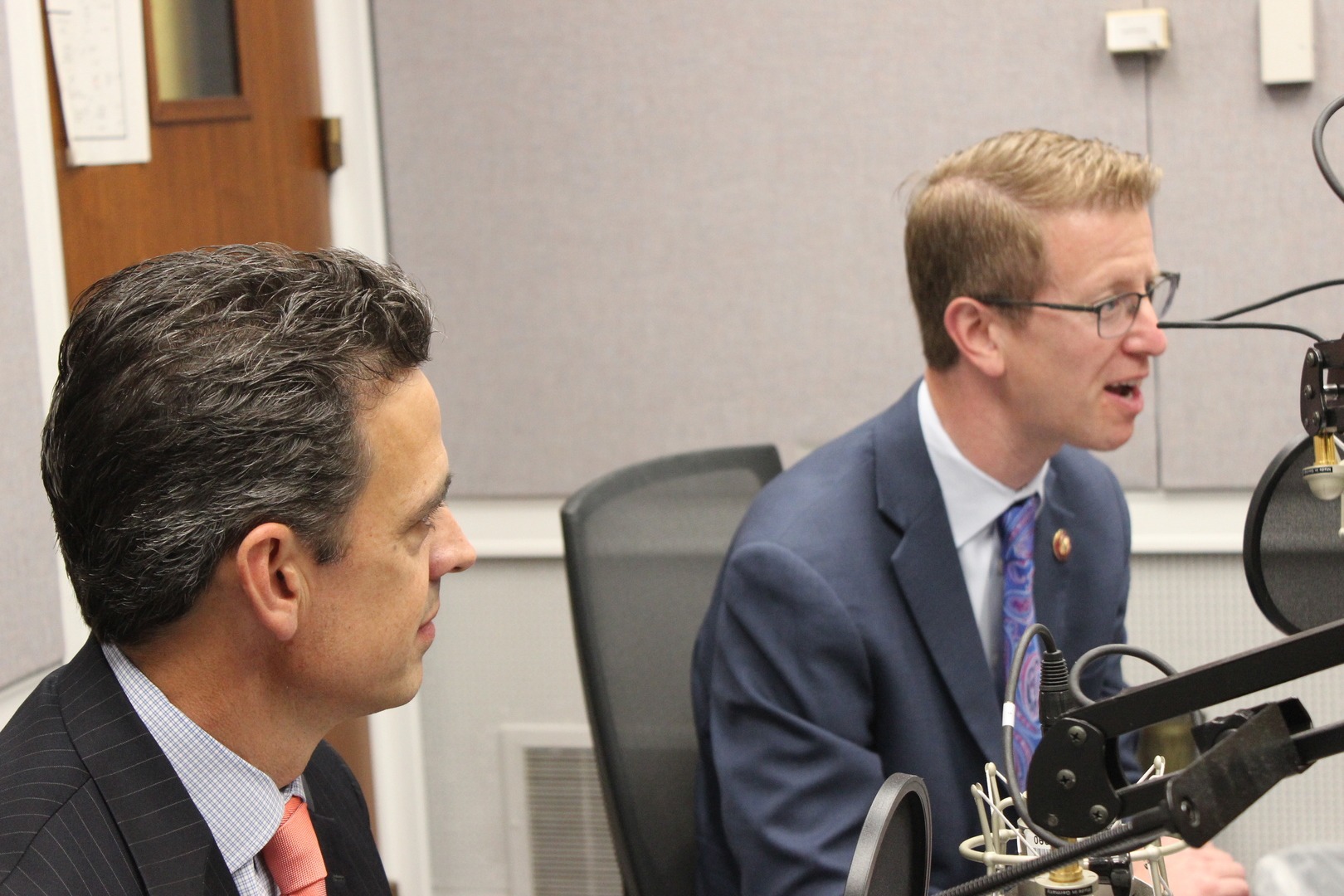With Congress in recess, it can rest up for the budget battles ahead
Members of Congress are off this week, for Passover, Easter or Ramadan. With any luck they're also thinking about getting after the 2022 budget before they return,...
Best listening experience is on Chrome, Firefox or Safari. Subscribe to Federal Drive’s daily audio interviews on Apple Podcasts or PodcastOne.
Members of Congress are off this week, for Passover, Easter or Ramadan. With any luck they’re also thinking about getting after the 2022 budget before they return, and before they turn all their attention to the mid-term elections. The Federal Drive with Tom Temin got the outlook from Bloomberg Government deputy news director Loren Duggan.
Interview transcript:
Tom Temin: Loren, there were some green shoots of maybe they would get after budget bills fairly quickly, when they do return. What’s the schedule? And what do you see ahead?
Loren Duggan: Well, as you noted, they’re off this week for the second week of a two week recess, but then looking to the period ahead, which there’s a lot to do, and not a lot of time to do it because of the midterm elections and extra recess as that happens, so they can go and campaign in the fall. But what we’re likely to see when they come back is more hearings on that budget request that President Biden set up in March. And then also thinking more about, you know, how to write the bills that that budget prompts.
The real issue always is, in recent years, what the top line is going to be for these bills. And one of the reasons it took so long for the fiscal 2022 budget to get signed into law in March is that they didn’t have a top line until this calendar year. So what people have been talking about is, what did we do to get that done earlier? How do we get in a room? How do we make progress? There was some optimism from Richard Shelby (R-Ala.), who’s the ranking member in the Senate on the Appropriations Committee. And from Patrick Leahy (D-Vt.), who’s the chairman there, they’re both retiring. So they don’t have that same election campaign pressures. But they are going to be key to coming up with a top line number. So I think what they’re doing is agreeing to start finding an agreement on this and working with their house counterparts to try and get a top line early to make this an easier process because the top line opens up how much you’ll spend on the 12 bills, and then you start arguing about the policy and the individual line items. But we’re still probably a ways away from seeing bills come out. But maybe the discussions will kick up once they’re back in town.
Tom Temin: Well, you know, federal agencies and people that concerned with getting the money on time always hope for Peeps from Congress, even though they get sardines, but maybe we’ll get some nice multicolored Peeps that tastes so sweet when they get back. And the U.S.-China competition bill that’s still very much an active burner situation.
Loren Duggan: That is before they left for their two week recess, both chambers of Congress named the negotiators who are going to get in a room and hammer out a final version of this. It’s going to be a pretty robust conference, a number of members were named from both the House and the Senate from a lot of different committees, reflecting how broad and sweeping this legislation is. One of the provisions that’s at the heart of it is $52 billion over several years to give to manufacturers to incentivize opening up chip production facilities, semiconductor production facilities here in the U.S. to try to create a greater domestic supply of those. The shortage around chips has been a driving force here, because chips are in everything now from cars, to even refrigerators, to appliances to, you name it. So having a better domestic supply there is a big deal. We saw President Biden go down to Greensboro, North Carolina last week and call on Congress to get this bill to his desk. So there’s pressure from the administration to get this done. There’s bipartisan support for it. There’s also a bipartisan kind of opposition to some of the elements from folks who are afraid that it’s corporate welfare, as they would call it, whether it’s from the Bernie Sanders wing of the Democratic Party who doesn’t want that, or even some on the conservative side who don’t think that that’s the right approach to doing that. So we’ll see if they can make progress on it. There’s a lot of different issues in here from foreign policy where it comes to China to human rights concerns, to reauthorizing things like the National Science Foundation and pumping money into NIST (National Institute of Standards and Technology). So there’s a lot of agencies who will be watching this bill and its fate because it could in some cases directly give them money like that 52 billion, or at least set up authorizations for future years that Congress will come back to.
Tom Temin: We’re speaking with Loren Duggan, deputy news director at Bloomberg Government. And as Congress is out there encountering their constituencies back home and almost every other person you talk to now has perhaps a mild case, but the COVID is very much extent in the land. And that affects their feelings, perhaps toward Title 42 policy with the immigrants coming from the southern border, I guess, every border and also the idea of a COVID relief package, anything that could move from what we saw before the recess, when they come back there?
Loren Duggan: It’s possible there was a bipartisan deal in the Senate on a $10 billion package that was focused on domestic needs when it came to COVID. So it was much more about therapeutics, and the needs to have diagnostics and things like that in this country. The agreement wasn’t loved by everyone, because in particular, it left off any international aid in helping to distribute vaccines abroad. So even though there was this $10 billion package, there was already talks about another package later on for international needs. They couldn’t get it to a vote, however, because they couldn’t come to an agreement on whether or not to have a separate vote on this Title 42 idea, which is a policy that the Trump administration put into place saying because of the pandemic, we’re not going to allow people to cross stay where they are. The Biden administration said that they were going to lift that. There’s bipartisan opposition to doing that and a vote on the Senate floor, especially with some of the members there could have been successful adding that language to the bill and possibly complicating it in the house. So it kind of hit the pause button on that.
The Title 42 issue will remain alive when they come back. And there’s a bill pending that would restore it with five Democrats already signed on to it, including folks like Kyrsten Sinema and Mark Kelly and Arizona, Maggie Hassan up in New Hampshire and a couple of others. Hasson and Kelly in particular are up this year may feel some pressure around the political ramifications of that, policy considerations as well. So we’ll see what happens with Title 42 because as we’ve seen, the COVID situation seem to be getting worse, just as they were heading out on their two week break with even some members testing positive towards the end of that week. So we’ll see if there’s pressure to expand that package, push through what’s there, or have a broader debate on what to do because there will be continuing needs for money as the year goes on.
Tom Temin: And before the break again, they were making some progress on nominations, not just the Supreme Court, Ketanji Brown Jackson. But there were many lower level appointees throughout the bureaucracy that they were getting to. Will that momentum returned, you think?
Loren Duggan: Well, the Senate seems to fill a lot of time with nominations and it takes time to process them, you bring them up, you file for cloture, two days later, you start having votes. So I would see Charles Schumer (D-N.Y.) putting more of these nominations up in the coming weeks, especially as they wait for legislation, things like the China competition bill, also know if their spending bills ever come to fruition, or if it can get back to their budget reconciliation, those would come to the floor. But they’ll continue chipping away at these nominations both to agencies and also to other courts, the district and circuit courts. That’s been a priority of the Biden administration, and in some ways, looking ahead to the possibility that they might not have the Senate after the November elections and making sure that they have as much momentum as they can to fill the courts and fill these executive jobs while they do have all the levers of government.
Tom Temin: Yes, because if you do look at the various cable channels, there’s some hysteria over midterms now starting, and if you look at the elections November and they have a couple of months to try to campaign, it seems like everything backs up to early summer, really, for Congress in a year like this. Is that about the right timetable?
Loren Duggan: That is. I think what you can do before the August recess is key, because you’ll come back after the August recess have a few weeks in September, maybe into October, but very much campaigns will be at the front of the mind then trying to get back to your district trying to be with the voters that you need to try to win over, in some cases in the House try to win over new voters. Because if your district lines shifted because of redistricting, you might have a different population that you’re representing then today than you would if you run and win reelection. So there’s a lot that feeds into this. Midterms are bad for the president’s party normally, and the headwinds are pretty strong with the economy. So and also, I think the important thing is there’s very slim majorities in both the House and the Senate. So it’s not going to take a lot for the Democrats to lose control of either chamber. So all that is going to feed into the thinking and agenda setting for the next several months.
Tom Temin: And the meantime, the Congress itself, the physical plant of Capitol Hill, clamped back down because of some of these cases that some members themselves had before they departed.
Loren Duggan: To an extent but the general direction is openness. Members really want to see the plans for the capitol to reopen. We saw more tours coming in towards the end of March. There are plans for a phased reopening to get it back to normal so that more groups can come in and see their lawmakers, see the Capitol, walk through Statuary Hall and see all those sites that make it such a great place to visit. So I think the trend is still in the reopening direction, but we might see some you know re-masking or more people being careful with that in the short term. As you know, D.C. has this mini wave it’s going through.
Tom Temin: Well when you see your member in person, don’t be disappointed. Loren Duggan is deputy news director at Bloomberg Government. Thanks so much.
Loren Duggan: Thank you.
Copyright © 2025 Federal News Network. All rights reserved. This website is not intended for users located within the European Economic Area.
Tom Temin is host of the Federal Drive and has been providing insight on federal technology and management issues for more than 30 years.
Follow @tteminWFED






